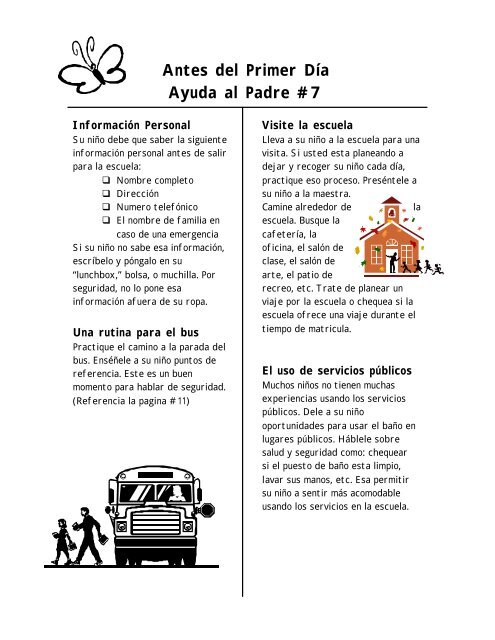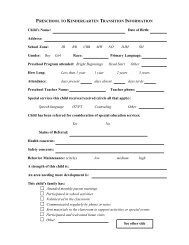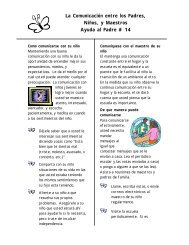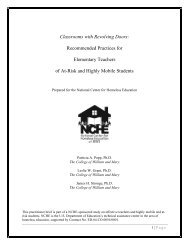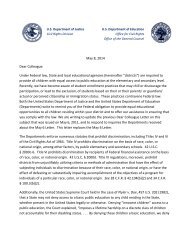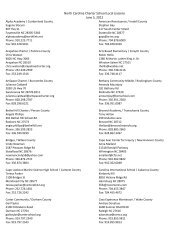Ayuda al Padre #7 - serve
Ayuda al Padre #7 - serve
Ayuda al Padre #7 - serve
Create successful ePaper yourself
Turn your PDF publications into a flip-book with our unique Google optimized e-Paper software.
Antes del Primer Día<br />
<strong>Ayuda</strong> <strong>al</strong> <strong>Padre</strong> <strong>#7</strong><br />
Información Person<strong>al</strong><br />
Su niño debe que saber la siguiente<br />
información person<strong>al</strong> antes de s<strong>al</strong>ir<br />
para la escuela:<br />
q Nombre completo<br />
q Dirección<br />
q Numero telefónico<br />
q El nombre de familia en<br />
caso de una emergencia<br />
Si su niño no sabe esa información,<br />
escríbelo y póng<strong>al</strong>o en su<br />
“lunchbox,” bolsa, o muchilla. Por<br />
seguridad, no lo pone esa<br />
información afuera de su ropa.<br />
Una rutina para el bus<br />
Practique el camino a la parada del<br />
bus. Enséñele a su niño puntos de<br />
referencia. Este es un buen<br />
momento para hablar de seguridad.<br />
(Referencia la pagina #11)<br />
Visite la escuela<br />
Lleva a su niño a la escuela para una<br />
visita. Si usted esta planeando a<br />
dejar y recoger su niño cada día,<br />
practique eso proceso. Preséntele a<br />
su niño a la maestra.<br />
Camine <strong>al</strong>rededor de<br />
la<br />
escuela. Busque la<br />
cafetería, la<br />
oficina, el s<strong>al</strong>ón de<br />
clase, el s<strong>al</strong>ón de<br />
arte, el patio de<br />
recreo, etc. Trate de planear un<br />
viaje por la escuela o chequea si la<br />
escuela ofrece una viaje durante el<br />
tiempo de matricula.<br />
El uso de servicios públicos<br />
Muchos niños no tienen muchas<br />
experiencias usando los servicios<br />
públicos. Dele a su niño<br />
oportunidades para usar el baño en<br />
lugares públicos. Háblele sobre<br />
s<strong>al</strong>ud y seguridad como: chequear<br />
si el puesto de baño esta limpio,<br />
lavar sus manos, etc. Esa permitir<br />
su niño a sentir más acomodable<br />
usando los servicios en la escuela.
Schooltime Schedule<br />
Establish a schooltime schedule.<br />
Consider bathtime, bedtime, wakeup<br />
time, time<br />
for dressing,<br />
packing<br />
lunches, and<br />
getting<br />
supplies<br />
together.<br />
Have your child help you in<br />
making this schedule. Make it clear<br />
which responsibilities are yours<br />
and which are your child’s. Also,<br />
the school schedule may be quite<br />
different from the one your child<br />
is used to at home⎯he may have to<br />
awaken earlier, eat earlier, and<br />
take a nap at a scheduled time.<br />
Find out when your child’s<br />
kindergarten class will be eating<br />
lunch. In many schools<br />
kindergarteners eat as early as 11<br />
a.m. For increased continuity<br />
between settings, begin to change<br />
the<br />
schedule<br />
your child<br />
is on to<br />
better<br />
match what<br />
he will be<br />
experiencing in kindergarten.<br />
Self-help Skills<br />
Encourage your child to take<br />
responsibility and accomplish tasks<br />
independently. Self-help skills that<br />
will help your child in kindergarten<br />
are:<br />
• Being able to use the toilet<br />
independently<br />
• Being able to put on a coat or<br />
sweater (use zippers, buttons,<br />
snaps, etc.)<br />
• Being able to tie his/her shoes<br />
• Being able to wash hands<br />
• Being responsible for putting<br />
away his/her own materi<strong>al</strong>s<br />
• Using good<br />
he<strong>al</strong>th<br />
habits<br />
(covering<br />
nose and<br />
mouth to sneeze or cough, using<br />
tissues, etc.)<br />
Safety Rules<br />
Make sure your child understands<br />
and obeys safety rules such as:<br />
• Cross the street only at<br />
crossw<strong>al</strong>ks<br />
• W<strong>al</strong>k on sidew<strong>al</strong>ks<br />
• Refuse gifts or rides from<br />
strangers<br />
• Remain seated until the bus is<br />
completely stopped<br />
• Listen to adults⎯teachers, bus<br />
drivers, crossing guards,<br />
princip<strong>al</strong>, etc. They may have<br />
important safety information to<br />
tell your child.<br />
(For more safety information see<br />
Parent Tip Sheet # 11)


